![]()
The Words of the Osmond Family
|
|
The Words of the Osmond Family |
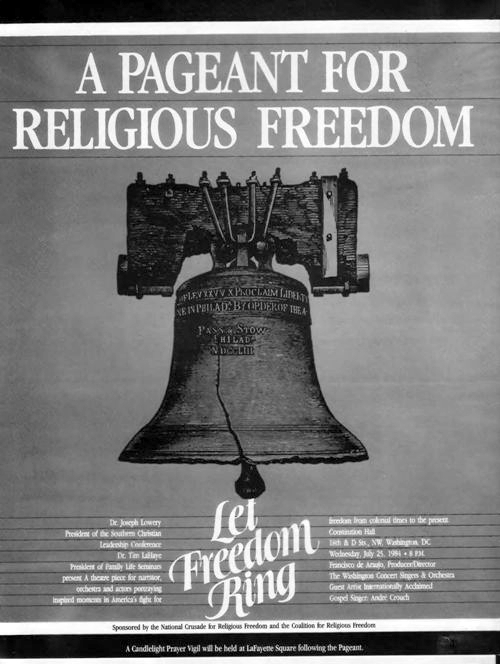
On July 25 over six thousand people from all across the United States, particularly the Northeast, gathered in Washington, D.C., for "A Pageant for Religious Freedom" sponsored by the National Crusade for Religious Freedom and the Coalition for Religious Freedom. In the afternoon, three thousand ministers attended a relevant seminar held at the Mayflower Hotel. In the evening an overflow crowd came to the actual "pageant" at Constitution Hall. This consisted of "Let Freedom Ring," a musical theater piece evoking memorable moments in the struggle for freedom in America, followed by nine guest speakers and a selection of songs by gospel singer Andre Crouch. The day was capped by a candlelight march to the White House, where a rally and vigil were held.
Whereas the pageant and vigil were mainly inspirational, the special seminar for ministers focused on concrete action. Topics discussed included becoming better informed about the threat to religious liberty, what ministers and churches can do to prevent being victims of government interference, and what action ministers and lay people can take to call the issue to public attention and initiate change.
The Seminar on Religious Freedom commenced with a reception and orientation meeting and then broke up into seven simultaneous workshops, each mediated by a prominent minister and featuring guest speakers to whom questions and comments were later addressed. Three of the workshops dealt with networking: "Mobilizing the Christian Community," "Working Effectively with the Media," and "Christian Involvement in the Democratic Process." Four groups focused on legal themes: "Should Your Church be Incorporated? Why Some Pastors are Dissolving Their Corporate Status," "Churches and the IRS," "Religion and the Schools," and "Implications of the Social Security Employment Tax on Churches." Each workshop had participants overflowing into the hallway.
The ministers then gathered for a general session, which featured a talk by Mr. Earl NV. Trent, Esq., legal counsel of The American Baptist Churches. "State and local government agencies look to the federal government for guidance," said Mr. Trent. "It appears that the Internal Revenue Service is emerging as the most efficient tool for controlling, restricting, and penalizing churches which dare to confront government based on certain theological precepts. In recent times the Internal Revenue Service has gone even further, in acts which amount to the persecution of those with unpopular religious beliefs."
Mr. Trent asserted that because the First Amendment prevents the IRS from legally gaining the control it seeks over the religious sector, the agency instead relies on establishing legal precedents to gain that control. To do this, the IRS targets the most vulnerable: new religions and small churches which do not have the resources to wage a successful battle against the IRS.
Mr. Trent discussed the legal precedents established in several cases and their implications for the larger religious community. In the case of United States v. Bob Jones University, because the university was discriminated on the basis of race, the IRS had little fear that there would be a cry of outrage against its proceedings. "In that case," Trent commented, "the [IRS] put forth a novel principle, a principle which is now the law of the land, that a religious organization must conform to the stated federal public policy of the country, the policy of the administration." Because the university did not conform to public policy concerning racism it lost its tax exempt status.
The possible effects of this legal precedent are cause for grave concern to all churches, Trent maintains. Mainline denominations such as the Baptist and Presbyterian churches stand in danger of losing their tax exempt status because they boycott Nestle's and oppose the use of Nestle's infant formula in third world countries, contrary to public policy. The Bob Jones case could also limit the proselytizing of views in areas "not consistent with public policy." Most importantly, the churches' freedom to oppose unjust laws or practices and foster social change, as it did in the civil rights movement, can now be officially restricted. Mr. Trent asserted that one of the many reasons why, the framers of the First Amendment provided for the separation of church and state was so that churches could act as a restraint upon government abuse of power.
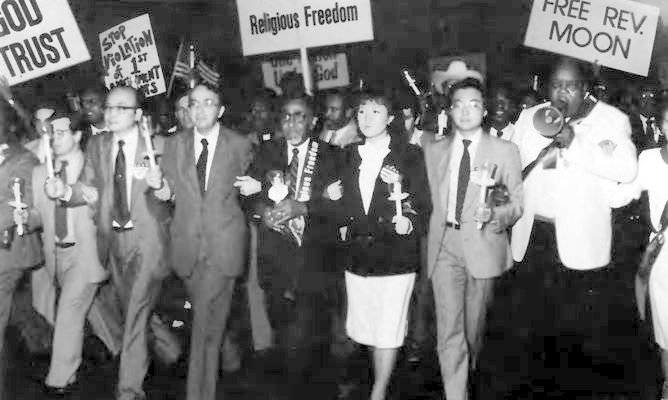
At
12:30 a.m., a candlelight march to the White House was led by (from
left to right) Col. Bo Hi Pak, Dr. Mose Durst, Dr. Joseph Lowery, In
Jin Moon and Jin Sung Moon.
Mr. Trent also went into detail about the implications of the case of Rev. Moon for the entire religious community. "There was no statute on any book which made what Rev. Moon did an offense or a violation of any criminal statute in the United States," stated Trent. He claimed the IRS "deliberately went after" Rev. Moon and the Unification Church in order to set important legal precedents. As a result of the Supreme Court's refusal to review the case, says 'Dent, "The IRS can now determine that, despite the views of the members and ministers of that church, the funds which were donated for the mission of that church are in fact not held by the church but are private assets."
Secondly, the case of Rev. Moon establishes a dangerous precedent concerning the powers of a jury. "The jury [in this case] was told that they should completely disregard what the members and ministers of that church felt and what they believed, and could impose their own views as to how the resources of that church should be spent and whether or not these resources were spent in fact in pursuing the religious mission of that church."
Thirdly, the case of Rev. Moon also sets the precedent that a church can be penalized as a result of its organizational structure. "The Unification Church was not incorporated, and the court held that the jury had a right to consider that the Unification Church in fact did not exist, simply because it had not complied with state laws which required the incorporation of these entities."
The example set by the IRS is being followed by other agencies of state and local governments throughout the county, Mr. Trent stressed. He cited several cases, including an instance in California where "all of the assets of the Worldwide Church of God were seized by the attorney general, and he in fact took over the operation of the church, moved into their offices, and controls not only the assets but everything the church does." There are many other cases where government is imposing a licensing requirement on churches which the religious community has always felt was precluded by the First Amendment. Mr. Trent cited particularly the case of Rev. Sileven in Nebraska, in which a Christian school was closed and the minister jailed "as a result of his failure to seek a license from the state to perform a function that churches have, since the beginning of time, seen as their prerogative."
Mr. Trent also cited instances where local governments in Florida as well as other states are imposing ordinances controlling the solicitation of funds for religious organizations, "requiring the solicitors to register with all kinds of personal information about themselves and about their church, and to expose all books of the religious organization to an audit and review by the local city councils and attorneys for local government agencies."
According to Mr. Trent, "This is not isolated; this is happening all over the country." Mr. "Rent contends that this phenomenon stems from the attitude nurtured by the IRS that churches are too free and too powerful, can mobilize people to make changes in society, and thus must be controlled.
Mr. Trent concluded that unless ministers can bring public attention to the government abuse of ministers and churches throughout the nation, "all of the religious community is in peril."
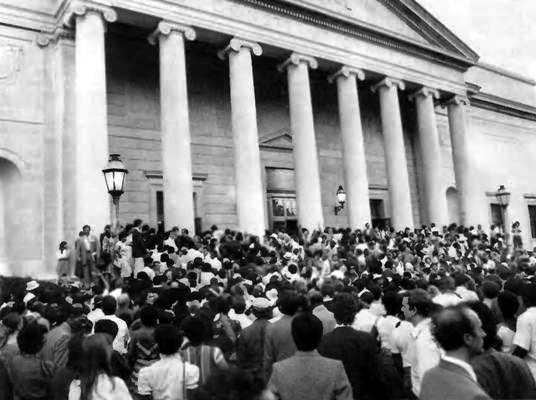
A
crowd of about 6000 people try to squeeze their way into Constitution
Hall for the Pageant for Religious Freedom.
Paul Cobb, the religion editor of The Post Newspaper Group and executive director of the National Crusade for Religious Freedom, was emcee for both the afternoon seminar and the evening. At the seminar's general session, with lively and informal eloquence, Mr. Cobb garnered enthusiastic response to future plans for the religious freedom movement. Within the next thirty to forty days, he said, longer workshops extending from two to five days would be given throughout the nation. Regional and statewide systems would be set up to accommodate simultaneous workshops in many cities, covering the topics explored in the present seminar plus more. "We are going to arm ourselves with education and information," he said. A computerized information network will also be set up to notify ministers of all court cases, particularly in their state, involving churches or ministers and a government agency.
Mr. Cobb emphasized the need to work at the grass roots level to bring the issue to public attention. "We know how to multiply probably better than anyone the ultimate leverage of concern in this society, and that is the voice of the people."
He also emphasized the need to network information and activities interdenominationally and nationwide, so that if there is a case of abuse of religious liberty in one city, for example, letters of protest will pour in from all over the country, and demonstrations with hundreds of believers and supporters will be held with press conferences in that city and throughout the nation. Cobb also suggested that a poll of all public officials and candidates be taken to ascertain their position on the issue, and on particular cases.
The ministers enthusiastically agreed to Cobb's exhortation to increase their numbers tenfold before the next national meeting three months from now, each pledging to bring ten ministers with them to increase their numbers to at least thirty thousand.
After a question and answer period, during which Dr. Mose Durst was called upon to answer a question about the aftermath of Father's going to jail, the seminar concluded with a banquet which featured several guest speakers; one of these was Dr. Franklin Littell.
At 6:30 in the evening the ministers left for Constitution Hall, where they were met by about three thousand other ministers and lay persons who had come by bus from eastern cities and from Washington to attend the pageant. Only four thousand people could be seated in the hall itself, and the rest remained outside, where a spontaneous show of speakers and song arose.
A small group of about twelve demonstrators denounced the event as a Unification Church "dupe" designed to free Rev. Moon from federal prison. Ministers outside the hall disputed this. "There is no way the committee is a front for the Unification Church," said Rev. Edgar Koons, president of the American Council of Christian Churches, and earlier a speaker at the afternoon seminar. "I'm a Bible- believing Baptist and I was convinced religious freedom was under attack years before what happened to Sun Myung Moon."
At 8:00 p.m. the pageant began. The musical-theatrical part of the program, "Let Freedom Ring," was created and conducted with great enthusiasm by Francisco de Araujo, and incorporated a chorus, orchestra, narrator and actors in an evocation of memorable moments in American history. Narrator Michael Handley set the stage with descriptions of characters and the events which surrounded them, while costumed actors portraying historical figures appeared in various places throughout the auditorium, and uttered ringing words about freedom and the costs of winning it and maintaining it. Historical figures portrayed included Governor William Bradford, Roger Williams, William Penn, Thomas Paine, Patrick Henry, John Adams, George Washington, Benjamin Franklin, Joseph Smith, Abraham Lincoln, and Harriet Tubman. Although the quotes of the historical personages concerned religious freedom in particular, civil liberties were inextricably tied into the theme. At intervals, the chorus and orchestra gave rousing renditions of favorite hymns. The program culminated in the portrayal of Rev. Everett Sileven confronting the judge in his case, and both the defending and prosecuting lawyers and the judge in the case of Rev. Moon.
The audience responded with enormous enthusiasm to all of the historic figures portrayed, particularly to Roger Williams, who outlined so clearly the separation of church and state. The performance was punctuated throughout with vibrant applause, and as the American flag unfurled from the ceiling during a choral rendition of "God Bless America," the whole audience arose in a standing ovation and sang along. The singing of "Let us break bread together on our knees" by soprano Yvette Matthews, portraying a newly freed slave, brought many to tears. The judges in the cases of both Rev. Sileven and Rev. Moon encountered marked boos, while Lincoln's Gettysburg Address elicited cheers and sobs. At the finale, the "Battle Hymn of the Republic," the whole audience arose again and the voices of thousands joined in the chorus, ending the celebration with a thunderous ovation.
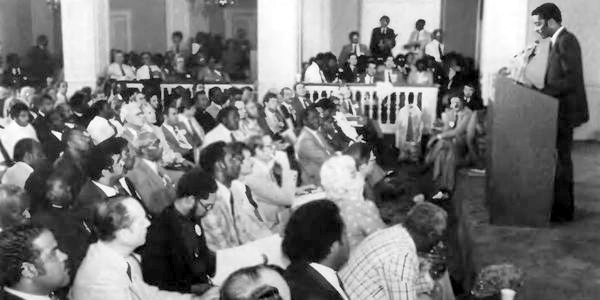
Earl
W. Trent, legal counsel of American Baptist Churches, addresses
ministers at the afternoon seminar held at the Mayflower Hotel.
Following "Let Freedom Ring," nine guest speakers addressed the audience. Paul Cobb introduced this half of the program by saying, "We are here today because we love God, we love America, and we love how diverse we are as human beings. We know the value of freedom."
Dr. Robert Grant, chairman of Christian Voice, attributed the current threat to liberty to "the vast sea of bureaucrats" who, though not elected, "have become the law, the ruling force in America." Government bureaucrats have taken upon themselves to decide what is religion and what is not, said Grant. He exhorted the audience to direct a flood of letters to President Reagan asking him to appoint a blue ribbon task force consisting of the finest constitutional minds in America, sharp theologians, and historians of religion to address this "terrible question of one- way bureaucracy that has power between its teeth, that is violating the Constitution, that has threatened the First Amendment, and is threatening our most basic liberties."
Dr. Tim LaHaye, founder of Family Life Seminars, president of the Moral Majority of California, and president of the Coalition for Religious Freedom, expressed concern that if the percentage of attacks on religious freedom that we have had during the past fifteen years continues during the next fifteen years, we will no longer have religious freedom in the 21st century. He blames the rise of attacks on religions upon "the secular humanist philosophy which has permeated this land for the past 75 years." But these problems are our own responsibility, says Rev. LaHaye, because "we have forgotten to set standards for the kind of people we elect to rule over us." He recommends that two criteria be applied to decide who should rule: commitment to traditional moral values and commitment to religious freedom. Rev. LaHaye called upon everyone to pray daily for the restoration of religious freedom, to speak out in defense of religious freedom, and to ask all who seek office, regardless of their creed, "What do you believe about man's responsibility to God and to God's laws?"
Dr. Ralph Abernathy, former president of the Southern Christian Leadership Conference, who was a leader of the civil rights movement and endured even the dynamiting of his church and home, lamented the fact that "too many of us want to reap the harvest without plowing the ground. We want the rain but we do not want the thunder." He reminded the audience that "freedom is not free." We must fight for the religious freedom of all humankind, he stressed. "None of us is free until all of us are free."
Dr. Greg Dixon, president of the American Coalition of Unregistered Churches, reminded the audience of the scriptural passage, "Where the spirit of the Lord is, there is liberty." Dixon says he fears that America has turned away from God, His word, and the great moral moorings of this nation. He warned, "We are beginning to lose our liberties because the spirit of God is leaving America" The Prophet of old saw the glory of God depart from Israel.
We as individuals must prevent this from happening to this nation. "We must turn back to God. We must confess our sins. We must repent." Speaking about the government, Rev. Dixon said that the forefathers of America knew that government uncontrolled could be a wild best. "For the first time in human history, two hundred years ago, our founding fathers found the way to chain that beast, and use it as a beast of burden to be a servant of the citizens of this land. However, the beast has gotten out of the cage, and unless we put it back in the cage quickly it'll be too late."
In Jin Moon, the second daughter of our True Parents then spoke. As she approached the podium all of the speakers on the stage stood up -- an honor not given any other speaker of the evening -- and many people in the audience also gave a standing ovation. She spoke with profound dignity and expressiveness, and her speech was often interrupted with warm applause.
Following her speech, Sen. Orrin Hatch of Utah, chairman of the Subcommittee on the Constitution of the Judiciary Committee, spoke. He cited DeTocqueville's comments on our nation: "America is great because she is good. If America ever ceases to be good, she will cease to be great." After bemoaning the jailing of ministers for their faith and the jeopardization of First Amendment rights he stressed, "We have to make America good again." He said he would try to obtain the Justice Department memo which reveals that three tiers of legal advisors recommended against pursuing charges against Rev. Moon because there was no criminal case. The memo's recommendation was overruled by a political appointee in the Justice Department, who handed down the order to indict Father.
Dr. Richard Rubenstein, Robert O. Lawton Distinguished Professor of Religion and the Director of Humanities at Florida State University, testified to Father's character and drew parallels between the role that Christianity played in the independence movements of Korea and the United States. Rubenstein asserted that in an era of absolute monarchs, if we had not had the committed faith that no human, but GM alone is Lord, we would not have had the courage to found a democratic republic, or the strength to preserve it for two hundred years.
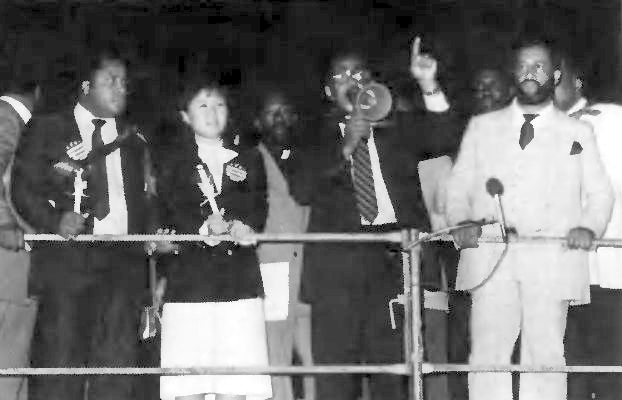
Dr.
Joseph Lowery speaks to the midnight crowd at Lafayette Park.
Dr. Joseph Lowery, president of the Southern Christian Leadership Conference, chairman of the National Black Leadership Forum, and president of the National Crusade for Religious Freedom, was heralded with tumultuous applause and a standing ovation by many members of the audience. His speech is almost impossible to describe, for it was not so much a speech as an antiphonal dialogue between him and the audience.
"We have come tonight to tell America that we want to let freedom ring. [cheers] Freedom from fear [uh-huh]; freedom from hunger [uh-huh]; freedom from materialism [uh-huh]; freedom from enslavement [oh, yes]; freedom from hatred [oh, yes]. Let freedom ring from sea to shining sea [his words are drowned out by cheers and applause]!" As the rhythmic interplay of speaker and audience became more climactic, it was as if the Holy Spirit revivals of a thousand black churches had all been condensed into one. "We shall unite in Christ. We shall unite in witness -- let freedom ring! Our adversity will be our strength -- let freedom ring! Our unity will be our power -- let freedom ring! Our faith will be our salvation. Let freedom ring!" Rev. Sileven was overcome with wonder at the mighty transformation of four thousand individuals into a single jubilant being. As wave after wave of cheers answered Lowery's litany, even the stagehands came out to witness a truly historic phenomenon. A torrential ovation shook the hall for more than two minutes after Dr. Lowery finished speaking.
Dr. Everett Sileven had the unenviable task of following Dr. Lowery. He is pastor of Faith Baptist Church in Louisville, Nebraska, has spent 157 days in jail for operating a church school and is due to return to jail for four months in September. "If I believed in reincarnation, I'd pray to God to send me back a black preacher," he declared, eliciting a gale of laughter from the exhilarated crowd. "There is only one message from God to America today: Repent or perish!" He delivered a public message to President Reagan. "Mr. President, you can lower inflation, you can lower the interest rate, you can reduce unemployment, but we insist on our freedom." Though Reagan promised less government intrusion into private affairs, said Rev. Sileven, we have more. "We just want to government out of our business, out of our homes, and out of our churches." He concluded with calling upon President Reagan to live up to his words when he said that it is not a matter of God being on our side, the question is are we on God's side. "We humbly ask you as our president to demonstrate to the world that you are indeed on God's side, by granting general amnesty...to over five thousand God-fearing America- loving citizens who are being persecuted for their religious beliefs."
The pageant came to a close with several musical selections by renowned gospel singer Andre Crouch.
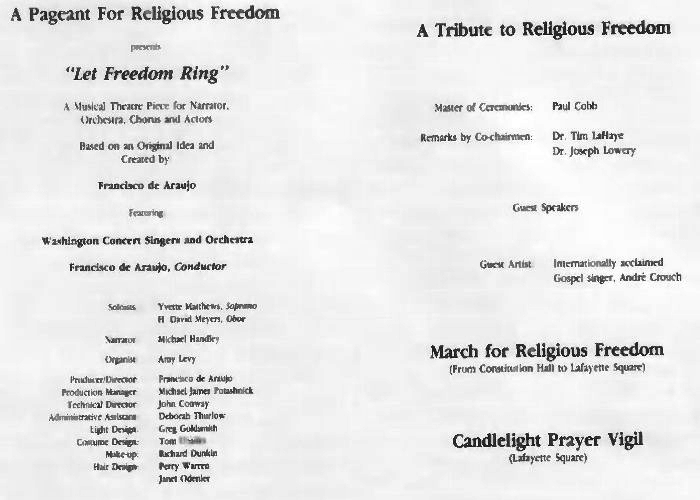
The thousands inside Constitution Hall then joined the crowd still outside and going strong at 12:30 a.m. (whose candles had been lit since ten o'clock). Together they commenced a candlelight march to Lafayette Park in front of the White House, singing the popular civil rights theme, "We Shall Not Be Moved." Bedecked with signs and candles, the crowd there gathered around a raised platform, where Dr. Lowery, In Jin Moon, Paul Cobb, Rabbi Ben Ami and others spoke and offered prayers. The rally-vigil continued until about two in the morning.
There is plenty of concern and enthusiasm in America to bring about a truly interdenominational and inter-religious nationwide movement for religious freedom.